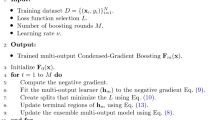Abstract
AdaBoost produces a linear combination of weak hypotheses. It has been observed that the generalization error of the algorithm continues to improve even after all examples are classified correctly by the current linear combination, i.e. by a hyperplane in feature space spanned by the weak hypotheses. The improvement is attributed to the experimental observation that the distances (margins) of the examples to the separating hyperplane are increasing even when the training error is already zero, that is all examples are on the correct side of the hyperplane. We give an iterative version of AdaBoost that explicitly maximizes the minimum margin of the examples. We bound the number of iterations and the number of hypotheses used in the final linear combination which approximates the maximum margin hyperplane with a certain precision. Our modified algorithm essentially retains the exponential convergence properties of AdaBoost and our result does not depend on the size of the hypothesis class.
This work was done while G. Rätsch was at Fraunhofer FIRST Berlin and at UC Santa Cruz. G. Rätsch was partially funded by DFG under contract JA 379/91, JA 379/71, MU 987/1-1 and by EU in the NeuroColt II project. M.K. Warmuth and visits of G. Rätsch to UC Santa Cruz were partially funded by the NSF grant CCR-9821087. G. Rätsch thanks S. Mika, S. Lemm and K.-R. Müller for discussions.
Preview
Unable to display preview. Download preview PDF.
Similar content being viewed by others
References
K.P. Bennett, A. Demiriz, and J. Shawe-Taylor. A column generation algorithm for boosting. In P. Langley, editor, Proceedings, 17th ICML, pages 65–72, San Francisco, 2000.
L. Breiman. Prediction games and arcing algorithms. Neural Computation, 11(7):1493–1518, 1999. Also Technical Report 504, Statistics Dept., University of California Berkeley.
Y. Freund. Boosting a weak learning algorithm by majority. Information and Computation, 121(2):256–285, September 1995.
Y. Freund and R.E. Schapire. Experiments with a new boosting algorithm. In Proc. 13th International Conference on Machine Learning, pages 148–146. Morgan Kaufmann, 1996.
Y. Freund and R.E. Schapire. A decision-theoretic generalization of on-line learning and an application to boosting. Journal of Computer and System Sciences, 55(1):119–139, 1997.
Y. Freund and R.E. Schapire. Adaptive game playing using multiplicative weights. Games and Economic Behavior, 29:79–103, 1999.
A.J. Grove and D. Schuurmans. Boosting in the limit: Maximizing the margin of learned ensembles. In Proc. of the Fifteenth National Conference on Artifical Intelligence, 1998.
R. Hettich and K.O. Kortanek. Semi-infinite programming: Theory, methods and applications. SIAM Review, 3:380–429, September 1993.
J. Kivinen and M. Warmuth. Boosting as entropy projection. In Proc. 12th Annu. Conference on Comput. Learning Theory, pages 134–144. ACM Press, New York, NY, 1999.
V. Koltchinskii, D. Panchenko, and F. Lozano. Some new bounds on the generalization error of combined classifiers. In Advances in Neural Inf. Proc. Systems, volume 13, 2001.
O.L. Mangasarian. Arbitrary-norm separating plane. Op. Res. Letters, 24(1):15–23, 1999.
S. Nash and A. Sofer. Linear and Nonlinear Programming. McGraw-Hill, New York, 1996.
J.R. Quinlan. C4.5: Programs for Machine Learning. Morgan Kaufmann, 1992.
J.R. Quinlan. Boosting first-order learning. Lecture Notes in Comp. Sci., 1160:143, 1996.
G. Rätsch. Robust Boosting via Convex Optimization. PhD thesis, University of Potsdam, October 2001. http://mlg.anu.edu.au/~raetsch/thesis.ps.gz.
G. Rätsch, A. Demiriz, and K. Bennett. Sparse regression ensembles in infinite and finite hypothesis spaces. Machine Learning, 48(1–3):193–221, 2002. Special Issue on New Methods for Model Selection and Model Combination. Also NeuroCOLT2 Technical Report 2000-085.
G. Rätsch, T. Onoda, and K.-R. Müller. Soft margins for AdaBoost. Machine Learning, 42(3):287–320, March 2001. also NeuroCOLT Technical Report NC-TR-1998-021.
R.E. Schapire. The Design and Analysis of Efficient Learning Algorithms. PhD thesis, MIT Press, 1992.
R.E. Schapire, Y. Freund, P.L. Bartlett, and W. S. Lee. Boosting the margin: A new explanation for the effectiveness of voting methods. Annals of Statistics, 26(5):1651 ff., 1998.
R.E. Schapire and Y. Singer. Improved boosting algorithms using confidence-rated predictions. Machine Learning, 37(3):297–336, December 1999. also Proceedings of the 14th Workshop on Computational Learning Theory 1998, pages 80–91.
L.G. Valiant. A theory of the learnable. Comm. of the ACM, 27(11):1134–1142, 1984.
J. von Neumann. Zur Theorie der Gesellschaftsspiele. Math. Ann., 100:295–320, 1928.
T. Zhang. Sequential greedy approximation for certain convex optimization problems. Technical report, IBM T.J. Watson Research Center, 2002.
Author information
Authors and Affiliations
Editor information
Editors and Affiliations
Rights and permissions
Copyright information
© 2002 Springer-Verlag Berlin Heidelberg
About this paper
Cite this paper
Rätsch, G., Warmuth, M.K. (2002). Maximizing the Margin with Boosting. In: Kivinen, J., Sloan, R.H. (eds) Computational Learning Theory. COLT 2002. Lecture Notes in Computer Science(), vol 2375. Springer, Berlin, Heidelberg. https://doi.org/10.1007/3-540-45435-7_23
Download citation
DOI: https://doi.org/10.1007/3-540-45435-7_23
Published:
Publisher Name: Springer, Berlin, Heidelberg
Print ISBN: 978-3-540-43836-6
Online ISBN: 978-3-540-45435-9
eBook Packages: Springer Book Archive




